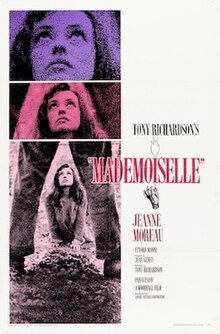Mademoiselle (1966 film)
| Mademoiselle | |
|---|---|
 Theatrical release poster | |
| Directed by | Tony Richardson |
| Written by | Marguerite Duras, Jean Genet |
| Produced by | Oscar Lewenstein |
| Starring | Jeanne Moreau |
| Cinematography | David Watkin |
| Edited by | Sophie Coussein Anthony Gibbs |
| Music by | Antoine Duhamel |
Production company | |
| Distributed by | Lopert Pictures Corporation |
Release dates | June 1966 (France) August 1966 (US) January 1967 (UK)[1] |
Running time | 105 minutes |
| Countries | France United Kingdom |
| Languages | French Italian |
| Box office | $575,000[2] |
Mademoiselle is a 1966 French - British drama film directed by Tony Richardson. The dark drama won a BAFTA award and nomination and was featured in the 2007 Brooklyn Academy of Music French film retrospective. Jeanne Moreau plays an undetected sociopath, arsonist and poisoner, a respected visiting schoolteacher and sécretaire at the Mairie in a small French village.
Synopsis
As the film begins, Mademoiselle is shown opening floodgates to inundate the village, so there's never a moment in the film that the audience believes she's a normal upstanding citizen, as the villagers do. But the film provides little insight into her motivation; she has no cause for revenge, and acquires no material gain or increased standing in the community from her furtive crimes. Later, she sets fire to houses and poisons the drinking troughs, causing the death of farm animals.
Out of pure prejudice, an Italian woodcutter (Manou, played in Italian by Ettore Manni) is the chief suspect. Sexual tension arises between Mademoiselle and Manou during a series of encounters in the forest. Finally, after a night of somewhat perverse intimacy in the fields, she falsely denounces him and the villagers hack him to death.
In a final scene, as Mademoiselle is leaving the village for ever, it is made obvious that the woodcutter's son (and Mademoiselle's former pupil) knows the secret.
Script
Having a script written by Marguerite Duras based on a story by Jean Genet, Mademoiselle could pass as an art film, a sexual thriller, or subtle horror.
Production
The film was shot on location in and around the tiny village of Le Rat, in the Corrèze département of central France. The entire production team stayed in what accommodation they could find locally for the duration of the shoot.
The director always saw Jeanne Moreau as the lead. He originally wanted Marlon Brando for the male lead, but scheduling could not be arranged.
Cast
- Jeanne Moreau – Mademoiselle
- Ettore Manni – Manou
- Keith Skinner – Bruno
- Umberto Orsini – Antonio
- Georges Aubert – René
- Jane Beretta – Annette (as Jane Berretta)
- Paul Barge – Young Policeman
- Pierre Collet – Marcel
- Gérard Darrieu – Boulet
- Jean Gras – Roger
- Gabriel Gobin – Police Sergeant
- Rosine Luguet – Lisa
- Antoine Marin – Armand
- Georges Douking – The Priest
- Jacques Monod – Mayor
Release
The film was released on DVD by MGM Home Entertainment in the United States in 2002.
Awards
1967 - Won: BAFTA award for Best Costume Design in B&W [British] (Costume designer Jocelyn Rickards won).[3]
1968 - Nominated: BAFTA Film Award: BAFTA Best British Cinematography (B/W) (Cinematographer David Watkin nominated).[3]
The film was entered into the 1966 Cannes Film Festival.[4]
References
- ^ "IMDB: Mademoiselle (1966) - Release dates". Retrieved 21 March 2010.
- ^ Tino Balio, United Artists: The Company That Changed the Film Industry, University of Wisconsin Press, 1987 p. 246
- ^ a b "IMDB: Mademoiselle (1966) - Awards". Retrieved 21 March 2010.
- ^ "Festival de Cannes: Mademoiselle". festival-cannes.com. Retrieved 8 March 2009.
